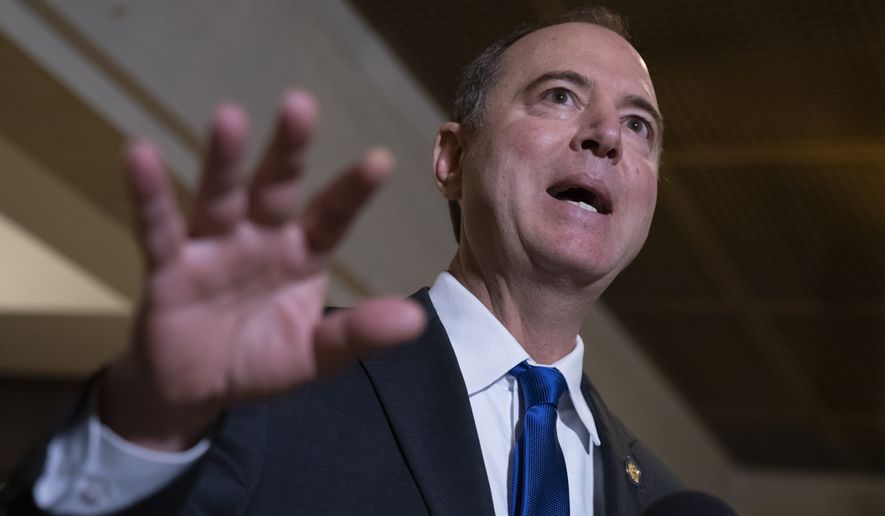Four administration officials defied subpoenas to testify Monday in the closed-door impeachment inquiry against President Trump, as House Democrats released the first transcripts from past secret proceedings, making a down payment on new promises of transparency to the month-old investigation.
National Security Council lawyers John A. Eisenberg and Michael Ellis, acting White House Chief of Staff Mick Mulvaney’s aide Robert Blair, and Office of Management and Budget official Brian McCormack obeyed White House orders not to testify behind closed doors, escalating the feud between Mr. Trump and Rep. Adam B. Schiff of California, the Democrats’ impeachment maestro.
“This will only further add to the body of evidence on a potential obstruction of Congress charge against the president,” Mr. Schiff, chairman of the House Permanent Select Committee on Intelligence, told reporters.
He had been slated for another day of secret hearings, continuing the impeachment inquiry begun on House Speaker Nancy Pelosi’s say-so in late September.
Yet he and two other committee chairmen, following rules the House approved last week, did release transcripts from Marie Yovanovitch, the former U.S. ambassador to Ukraine, and Michael McKinley, who was a top aide to Secretary of State Mike Pompeo.
Neither shed much light on the crux of the impeachment push — Mr. Trump’s dealings with Ukrainian President Volodymyr Zelensky — but they did raise concerns more generally about politics seeping into the State Department’s mission, particularly when it came to Trump confidante Rudolph W. Giuliani.
Ms. Yovanovitch testified that she felt she was the victim of a whisper campaign by Mr. Giuliani — something Democrats leading the impeachment probe said is key evidence against the president.
“The transcripts of interviews with Ambassadors Yovanovitch and McKinley demonstrate clearly how President Trump approved the removal of a highly respected and effective diplomat based on public falsehoods and smears against Ambassador Yovanovitch’s character and her work in support of long-held U.S. foreign policy anticorruption goals,” said the three committee chairmen who are leading the investigation.
Mr. Trump, talking to reporters at the White House, downplayed comments he made to Mr. Zelensky in a July 25 phone call suggesting the ambassador was damaged.
“I really don’t know her,” Mr. Trump said this week. “But if you look at the transcripts, the president of Ukraine was not a fan of hers either. I’m sure she’s a very fine woman. I just don’t know much about her.”
The transcripts are the first step in Democrats’ campaign to convince the public that Mr. Trump crossed lines and deserves impeachment and removal from office for his behavior with Ukraine earlier this year, when he withheld military funds and demanded Ukraine investigate corruption, including allegations against former Vice President Joseph R. Biden, now a political opponent.
The president released a transcript in late September, and that reconstructed version of the conversation does not show an explicit quid pro quo, but other officials have reportedly told Congress they understood it to be a quid pro quo.
Ms. Yovanovitch said Mr. Trump’s interest in rooting out corruption in Ukraine was well known and dated to before Mr. Zelensky’s taking office.
But both ambassadors said they fretted over mixed messages coming from the Trump administration on policy, and worried that politics was intruding into the department’s work.
Mr. McKinley resigned his position because he was frustrated that the department did not object to Mr. Trump’s disparaging Ms. Yovanovitch in the July phone call with Mr. Zelensky.
“In this context, frankly, to see the emerging information on the engagement of our missions to procure negative political information for domestic purposes, combined with the failure I saw in the building to provide support for our professional cadre in a particularly trying time, I think the combination was a pretty good reason to decide enough, that I had — I had no longer a useful role to play,” he said.
Still, he said he had no personal knowledge of the Trump-Zelensky interactions, and didn’t even know about the July phone call until the transcripts were released.
Republicans on Capitol Hill, who have long complained about the probe’s secretive closed-door interviews, accused Democrats of selectively releasing the information.
“Democrats cherry-pick which transcripts they release and when,” Rep. Jim Jordan of Ohio, ranking Republican on the House Oversight Committee, wrote on Twitter. “Why not release Ambassador Volker’s testimony? He was the very first witness to testify.”
Testimony by Kurt Volker, who had been a top liaison to Ukraine, and Ambassador to the European Union Gordon Sondland, are expected to be the next transcripts released.
Republicans say that while they expressed befuddlement at Mr. Giuliani’s meddling, they did not see a quid pro quo in the president’s dealings with Ukraine.
During her testimony, Ms. Yovanovitch had some surprising praise for Mr. Trump, saying his approach toward Ukraine was paying off.
“I actually felt that in the three years that I was there, partly because of my efforts, but also the interagency team, and President Trump’s decision to provide lethal weapons to Ukraine, that our policy actually got stronger over the last three years,” she said.
• Stephen Dinan can be reached at sdinan@washingtontimes.com.
• Gabriella Muñoz can be reached at gmunoz@washingtontimes.com.




Please read our comment policy before commenting.